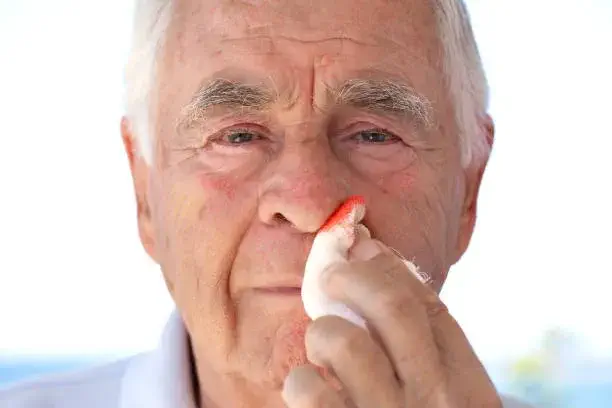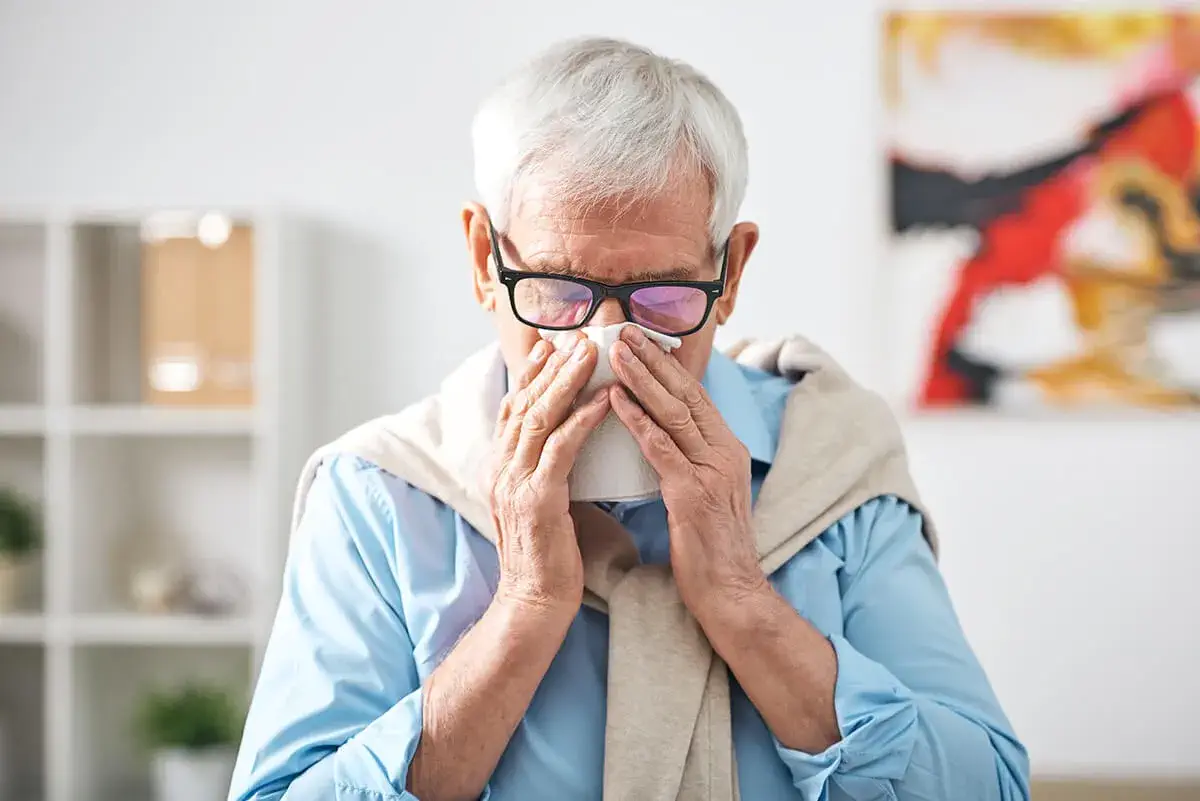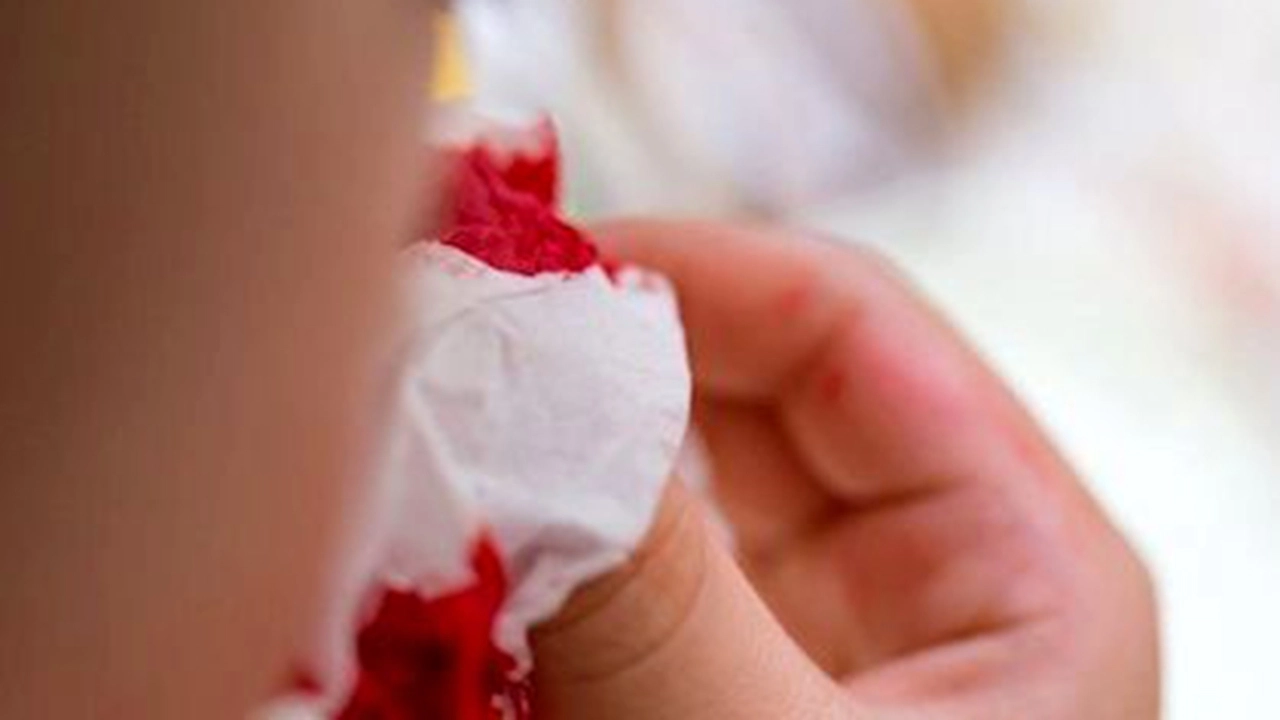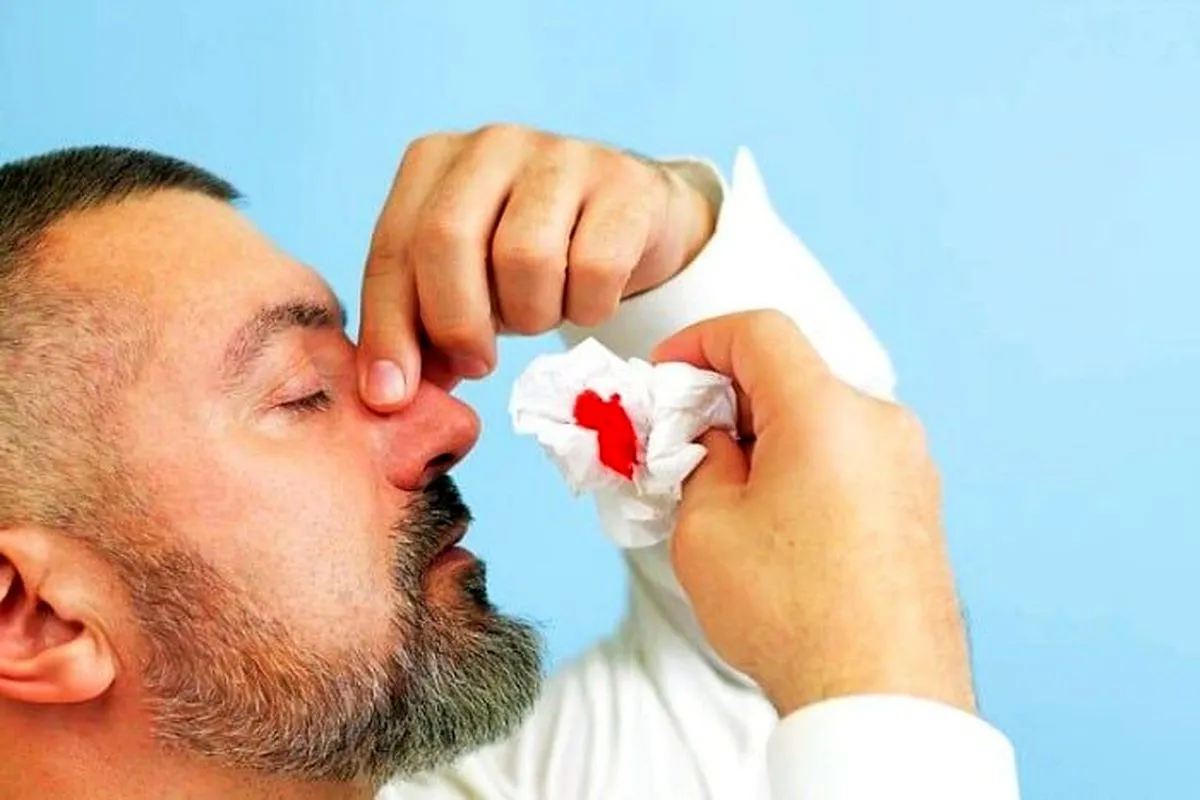
Causes of Nosebleeds in Elderly + Prevention and Treatment
Nosebleeds in elderly, or in the specialized correction “epistaxis in old age”, are not very worrisome. However, it is better not to ignore it. Sometimes, nosebleeds (epistaxis) in seniors may be a sign of an underlying problem. As we age, the blood vessels in the nose become thinner and more sensitive. This causes the nose to become sensitive and bleed with the slightest blow or dry air.
In addition, high blood pressure, taking blood-thinning medications, and some chronic diseases provide the basis for nosebleeds in seniors. Elderly people who live in dry and hot environments or use nasal sprays a lot are also more likely to suffer from nosebleeds than others. In this content from the humanhealthmag blog, we examine the causes of nosebleeds in the elderly. Also, we explain simple but effective methods of prevention and treatment.
12 Common Causes of Nosebleeds in Elderly
- Chemical irritants, such as ammonia
- Chronic sinusitis
- Cocaine use
- Cold
- Deviated nasal septum
- Foreign object in the nose
- Congestion
- Nasal sprays, such as those used to treat allergies, if used continuously
- Non-allergic rhinitis (chronic congestion or sneezing not related to allergies)
- Blow to the nose
- A minor injury to your nose
- Changes in humidity or temperature can cause your nose to dry out and crack

What Causes Seniors to Have Nosebleeds?
Why do elderly get nose bleeds? Knowing the causes of nosebleeds in elderly plays a useful role in preventing and treating them. Below, we have examined the most common causes of nosebleeds in older adults.
- Thinning of Blood Vessels with Age
As we age, the vessels inside the nose, like the rest of the body, become weaker and thinner. These sensitive capillaries are damaged much more easily than before. Sometimes a sneeze, a sniff, or even wiping the nose with a tissue is enough to cause a nosebleed.
- High Blood Pressure
One of the most common diseases of old age is high blood pressure. When the pressure in the veins increases, pressure is exerted on the delicate capillaries in the nose. As a result, these vessels may rupture and cause nosebleeds. Nosebleeds caused by high blood pressure are usually sudden and, in some cases, severe.
- Dry Indoor or Living Environment Air
The elderly spend most of their time at home. If the air is dry (for example, due to the use of a heater, a heater, or the lack of a humidifier), the mucus inside the nose becomes dry and cracked. These cracks can bleed easily (even without trauma).
- Underlying Medical Conditions (such as blood or kidney disorders)
If nosebleeds occur frequently, they can be a sign of an underlying condition such as platelet dysfunction, blood clotting problems, or kidney disease. Of course, this type of nosebleed is rare in older people. However, if nosebleeds occur frequently, it is best to see a doctor to check the cause.
- Use of Blood-Thinning Medications
Many seniors take medications such as aspirin, warfarin, or similar medications to prevent stroke or heart disease. These medications make the blood clot more slowly. For this reason, if a capillary in the nose breaks, the bleeding will be heavier or longer than normal.
- Minor Trauma or Nose Picking
Sometimes seniors unconsciously scratch or clean their nose. This causes the delicate blood vessels inside the nose to rupture. Since the capillaries in the nose thin as we age, even a small pressure or a finger bump is enough to cause the capillaries to bleed.
- Nasal Cancer
Occasional or frequent nosebleeds, especially if they come from just one nostril, may be an early sign of nasal or sinus cancer. Nasal cancer occurs when abnormal cells in the nasal or sinus area begin to grow uncontrollably. These cells put pressure on the blood vessels, causing bleeding.
What Causes Sudden Nosebleeds in Elderly?
Sudden nosebleeds can have both harmless and serious causes. But 9 out of 10 people face harmless causes of this condition. The main causes of sudden nosebleeds in elderly include the following:
- Dry or very dry air (most common)
- Cleaning the nose with hands
- Flu
- Trauma
- Insertion of a sharp or irritating foreign object
- Alcohol or drug consumption
- Altitude changes
- Sinusitis

In some rare cases, there may be more dangerous causes behind sudden nosebleeds (epistaxis) in elderly. But it is too early to worry because sudden nosebleeds, after you have tried all the above treatments and they have not worked, should occur at least once or twice a day for at least 4 days to suspect more dangerous causes. More dangerous causes of sudden nosebleeds in seniors include the following:
- High blood pressure
- Blood infection
- Brain or nasal cancer
When should you worry about a nosebleed in the elderly? If the patient is under 50 years old and blood pressure is confirmed as the cause of his sudden nosebleeds, you should be a little worried. Because high blood pressure is not very common at that age and can have other hidden causes such as cardiovascular or liver and kidney disease. Of course, as we said, these cases are rare.
Causes of Morning Nosebleeds in Elderly
Morning nosebleeds usually occur due to dry air during the night and damage to the blood vessels inside the nose. When the heater or air conditioner is on in the room at night, the humidity in the air decreases and the lining of the nose dries out. This dryness causes the veins to crack and become vulnerable. In addition, sleeping in certain positions or the pressure from sleeping on your face can also put pressure on the blood vessels in the nose and cause morning bleeding.
Causes of Nosebleeds in Elderly at Night
Nosebleeds during sleep usually occur for the same reasons as nosebleeds during the day. Dry room air, allergies, or upper respiratory tract infections can irritate and make the delicate lining of the nose vulnerable. In addition, sleeping on your side or putting direct pressure on your nose while sleeping can also damage the blood vessels and cause nighttime bleeding. This condition is exacerbated by dry air at night, increasing the likelihood of nosebleeds.
Who Gets Nosebleeds in Old Age?
Nosebleeds in old age can happen to anyone, but they are more common in people who use blood thinners such as aspirin, anticoagulants such as warfarin, or people with blood clotting disorders. It is better for these people to see a specialist doctor immediately when they have a nosebleed and get treated to prevent any side effects.
For most older people, occasional nosebleeds may not be a cause for concern. But frequent nosebleeds in old age can indicate more serious conditions such as clotting disorders, heart problems, high blood pressure, and some types of cancer. Frequent nosebleeds may mean that you have a more serious problem. For example, nosebleeds and bruising can be early signs of nose or blood cancer. Nosebleeds can also be a sign of a blood clot or blood vessel disorder, or a tumor in the nose (either noncancerous or cancerous). Who gets nosebleeds in old age?
Nosebleeds in old age can happen to anyone, but they are more common in people who use blood thinners such as aspirin, anticoagulants such as warfarin, or people with blood clotting disorders. It is better for these people to see a specialist doctor immediately when they have a nosebleed and get treated to prevent any side effects.
For most older people, occasional nosebleeds may not be a cause for concern. But frequent nosebleeds in old age can indicate more serious conditions such as clotting disorders, heart problems, high blood pressure, and some types of cancer. Frequent nosebleeds may mean that you have a more serious problem. For example, nosebleeds and bruising can be early signs of nose or blood cancer. Nosebleeds can also be a sign of a blood clot or blood vessel disorder, or a tumor in the nose (either noncancerous or cancerous). In general, the following people are more prone to nosebleeds:
- Elderly people with high blood pressure
- People who take blood-thinning medications
- Elderly people who live in hot, dry climates
- People who suffer from seasonal allergies and sensitivitie
- People who constantly use nasal sprays or decongestant drops
- People who pick their nose a lot
- People who have a history of nose fractures or surgery
- People with kidney or blood diseases
- Elderly people who have a weak immune system
- People who are not well-nourished

How to Prevent Nosebleeds in Elderly?
You can prevent nosebleeds in elderly by following a few simple but effective strategies:
- Keep the air in your home humid
Dry air is one of the main causes of nosebleeds. Using a humidifier or placing a container of water on a heater increases the humidity in the environment and prevents the nasal mucosa from drying out.
- Moisten the inside of the nose with a salt-free ointment or spray
Using Vaseline ointment, A and D ointments, moisturizing creams, or saline solution inside the nostrils (with a cotton swab or clean finger) can prevent the mucosa from cracking. This is especially effective in the winter or when using a heater.
- Check your blood pressure regularly
High blood pressure is one of the important causes of nosebleeds in the elderly. This factor can be controlled to a large extent by regularly controlling blood pressure and taking the right medications.
- Do not stay in hot weather for a long time
High heat causes dryness of the nasal mucosa. It is better to keep the temperature of the house moderate and not to use the heater or heater excessively. We also recommend not to be exposed to the sun for a long time.
- Avoid using nasal sprays arbitrarily
Excessive use of decongestant sprays or nasal medications can irritate the mucous membrane. If use is necessary, it should be under the supervision of a doctor and excessive use should be avoided.
- Do not manipulate your nose too much
Many nosebleeds occur due to scratching, picking, or excessive cleaning of the nose. The elderly should be encouraged not to manipulate their nose and, if it itches, only wipe it gently with a soft tissue.
- Have a healthy diet rich in vitamins
A healthy diet and adequate intake of vitamins C and K help strengthen blood vessels and reduce the risk of bleeding
- See a doctor if nosebleeds occur frequently
If nosebleeds are frequent, unilateral, or for no apparent reason, a doctor should examine them to identify and treat the cause.
How to Cure Nose Bleeding in the Elderly
One of the role of the home care nurse and attendants isto perform a series of measures when an elderly person has a nosebleed.
- The elderly should sit on a chair for 10 to 15 minutes. Then, hold the soft part of the nose (just above the nostrils) with your hand and rotate it slightly.
- Bend the elderly’s body forward and ask them to breathe through their mouth. In this way, the blood will drain through the nose.
- Cover an ice pack with a cloth or towel and place it on the nose.
- If the nosebleed does not stop after taking the above steps, it is necessary to see a doctor.
Concluding Remarks
Nosebleeds in old age is not a serious problem. But it is better to pay attention to them if they occur repeatedly. In this content, we explained the causes of nosebleeds in elderly and provided solutions for their prevention and treatment. Understanding the causes of epistaxis in elderly will help you deal with them better and more calmly.
If you have a senior loved one in your family, we suggest you to read other contents of humanhealthmag. Our experts have examined the common problems of ederly health that most them face and have provided you, our dear audience, with effective ways to manage them.
Loved this article? Or do you have suggestions to make it even better? Please share your thoughts in the comments below, and let’s work together to build better content!

Frequently Asked Questions
What causes nosebleeds in elderly?
As people age, they are more likely to get nosebleeds. This may be because blood clotting slows down with age, especially in people approaching age 50. Also, conditions such as high blood pressure, atherosclerosis (hardening of the artery walls), or bleeding disorders are more common in this age group and can lead to vulnerability of the blood vessels inside the nose.
How to stop a nosebleed in the elderly?
Hold the elderly person’s head up for 15 minutes, then ask them to rotate the soft part of the nose with their hands. Meanwhile, put an ice pack on the nose.
What causes sudden nosebleeds in the elderly?
Sudden increases in blood pressure, severe nasal dryness, forceful sneezing or blowing, and trauma to the nose are some of the causes of sudden nosebleeds in the elderly.
